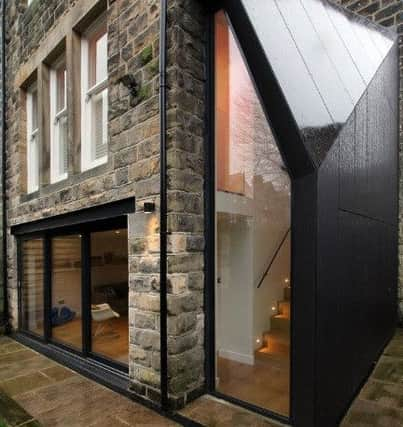Expert advice on how to architect your home


The dream combination of a good architect and a client open to ideas can result in great architecture.
If you want proof of this take a look at the shortlist for this year’s Royal Institute of British Architects Yorkshire awards. The winners will be announced on Thursday, April 21.
Advertisement
Hide AdAdvertisement
Hide AdThe shortlist boasts an eco-friendly convent in the North York Moors with a breathtakingly beautiful, light-filled, contemporary church. It was designed by Feilden Clegg Bradley with input from the nuns. Then there’s the Laidlaw Library, commissioned by Leeds University. It too is a modern masterpiece that doesn’t just look good, it works for both students and staff. Both of these projects were funded by large budgets but even a small extension or remodelling can benefit from the expert eye of an architect. They know how to make best use of space, they have clever ways of bringing light into a room and they know how to make an interior flow. In short, what they do is give a home feel-good factor, if you will let them. Clients who refuse to listen to good advice and those who interfere and change agreed plans part way through a project all compromise the design.
Ruth Donnelly, founder of Wetherby-based Doma Architects, had an excellent relationship with her clients. The project, a contemporary side extension to a Victorian house, is up for an RIBA Yorkshire award and has already won a small projects prize from the Architects Journal. We asked her for some tips on how to find the right architect and how to get the best out of them.
Ruth says: “An architect can unlock the potential of your home. The person you select will be the brains behind your project, an invaluable problem solver, a good listener, and the one keeping your budget on track.”
*Do you need an architect? As with all professions you usually get what you pay for and cutting corners with your design or designers could end up costing significantly more than a logical and well-planned project.
Advertisement
Hide AdAdvertisement
Hide AdIt is important to note that not all those working as ‘architects’ are indeed architects and this may be reflected in the associated fees and the level and quality of the service provided.
A list of qualified Architects can be obtained from Architects Registration Board, www.arb.org.uk. The RIBA, Royal Institute of British Architects, provides additional certification through Chartership. It also provides a very useful “find an architect” service which matches people with local architects with relevant specialisms, www.architecture.com/FindAnArchitect/FAAHome
Relationships: To create a space that works for you and your lifestyle, they will need to understand your habits and hobbies as well as your tastes. You need to feel comfortable with them, so always speak to more than one to make sure you make the right decision for you.
*Style: Some architects have a definitive style. Look through their websites before you arrange a meeting to make sure that this style suits you.
Advertisement
Hide AdAdvertisement
Hide Ad*Service: Architects can provide as much or as little creative advice as the client requires. Every project is individual and bespoke, just like the clients. Sometimes all that’s needed is a quick concept sketch or brain storm; other times a full service can be provided taking away significant worry and uncertainty.
*Brief: The most important stage of any construction project is determining the brief and what you want from the end result. Create a scrap book or mood board of images of things that inspire you, whether it is a house extension, a storage solution or a kitchen worktop that you like.
*Clarity: Make sure that you fully understand the architect’s design before you make a start on site. Architects work in two dimensions with plans and elevations that are very abstract. Do not be embarrassed to ask for a quick sketch or a 3D image or model to explain how the space will look or feel. The more information that you request before building starts, the more you and the builder will understand beforehand. This often results in cost certainty as changes are less likely to be requested on site.
*www.domaarchitects.co.uk